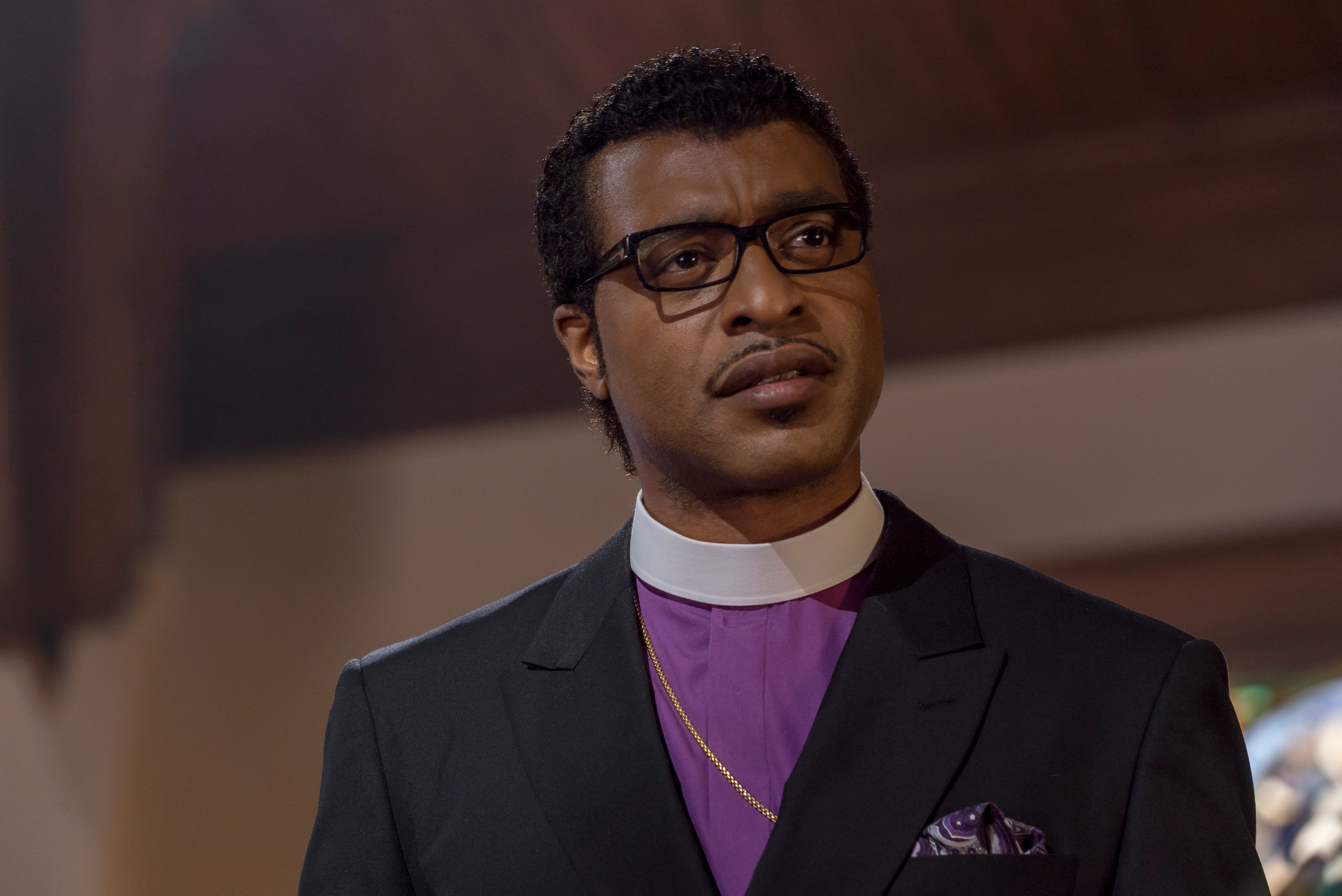Chiwetel Ejiofor can't absolve Come Sunday of its many dramatic sins

In the late ’90s, evangelical bishop Carlton Pearson was watching a news report about the Rwandan genocide while caring for his infant daughter when he had a revelation. What if there was no hell? Would a loving, caring, almighty God really sentence billions of people, including starving African children, to eternal damnation if they didn’t accept Jesus into their hearts? At the time, Pearson was an evangelical superstar: He had a 5,000-person integrated congregation at the Higher Dimensions megachurch in southern Tulsa, Oklahoma (an area that infamously kept segregated schools until the ’70s), flew around the country preaching traditional doctrine alongside luminaries like Jerry Falwell and Pat Robertson, and had even prayed in the White House under two different administrations. But that night, when Pearson heard God’s voice say that everyone was saved regardless of their faith, he had no idea his professional life would be torn asunder by his re-reading of scripture.
Pearson’s story is the basis of Joshua Marston’s inert drama Come Sunday, which follows the Bishop’s struggles with his epiphany in the face of an inflexible religious community. As soon as Pearson, played by Chiwetel Ejiofor, begins preaching his new controversial sermons that emphasize inclusion and love rather than fear, his once-loyal flock quickly abandons him. His congregation, appalled at the idea that their religious devotion is all but irrelevant, dwindles at a rapid rate. His elderly mentor Oral Roberts (Martin Sheen), who embraced Pearson as his “black son,” turns on him in a heartbeat, believing that Satan has taken a hold of him. His religious and business partner Henry (Jason Segel) tearfully abandons his brother-in-faith to start a new church, unable to accept the responsibility of condemning thousands to hell if Pearson happens to be wrong. The only people left standing by his side are his devoted, burdened wife Gina (Condola Rashad), and Reggie (Lakeith Stanfield), Higher Dimensions’ closeted organist who’s dying of an AIDS-related illness.
Though Marcus Hinchey’s script, based on a 2005 episode of This American Life, adeptly captures Pearson’s spiritual crisis, partially spurred by his failure to help his jailed Uncle Quincy (Danny Glover), it’s ill equipped to bring the subsequent fallout to life. Come Sunday admirably refuses to paint Pearson’s evangelical opponents as cheap villains, even when, say, Roberts’ vile homophobia places him in that corner anyway, but its dutifully respectful tone mutes the drama of the whole situation. Hinchey understandably chooses to dramatize Pearson’s story via interpersonal strife, presumably because abstract theological discussions aren’t suited for the big (or laptop) screen, and yet this decision renders the textual foundation of Pearson’s new belief a moot point. (Marston pays lip service to the Bible’s contradictory lessons in a key scene, but the rest of the film essentially ignores the actual scripture.) Furthermore, Marston and Hinchey get so caught up in Pearson’s heretical status within his community that they forget to service his larger, more salient point: Human beings do such a good job at creating hell on Earth that God has no use for one in the afterlife.
Despite committed performances from most of the cast (especially Ejiofor, who imbues Pearson with a gentle yet stubborn spirit), Come Sunday can’t shake its middling script and perfunctory direction, both of which iron out the myriad complications brought forth by Pearson’s change of heart. But the Screenwriting 101 clichés and bland visual style are nothing compared to Come Sunday’s refusal to examine the real-life implications of the evangelical belief system. It’s commendable that producers Marc Forster and Ira Glass want to depict religious Christians in a respectable light within a mainstream film, but the film papers over the more noxious elements of their faith. When Henry tells Pearson that he’s leaving Higher Dimensions, Marston frames it like a tragic break up, but that decision completely flattens the discomfiting subtext: Henry believes that inclusivity and ideological diversity are existential threats to his faith.
Moreover, the heinous way Come Sunday uses Reggie as a vehicle for Pearson’s evolving views on sexuality (from “being gay and doing gay aren’t the same thing” to eventual acceptance of Reggie’s identity as he slowly becomes more ill) effectively elides the doctrine that kept Reggie alone and ashamed in the first place. Come Sunday ends with Pearson fully embracing his more progressive worldview, but because it never really reckons with the ramifications of his initial orthodoxy, his transformation isn’t a deep one. To achieve real impact, the film would have to accept that ostensibly compassionate gospel can be weaponized by otherwise good men.